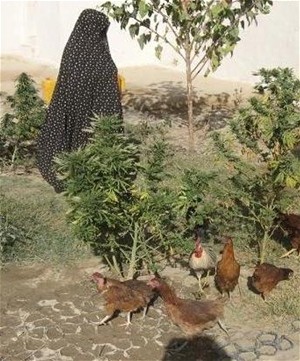
A poultry farmer tends to her chickens in Qalat, Zabul.
USAID/LGCD
Training provides opportunities for women farmers to earn an income and improve their standard of living.
30 NOVEMBER 2009 | QALAT, ZABUL PROVINCE, AFGHANISTAN
Bibi Derkho, a farmer in Afghanistan, has sent her children back to school after opening her own poultry business in Qalat district of Zabul province. “Before, my children were working to support the family,” she said, “and now I am supporting the family and the children are going to school.” Bibi Derkho is one of 180 women selected by local government representatives to attend a six-month training in home-based poultry rearing.
As many as 35 women who attended the training have opened their own home-based poultry businesses in villages in and around Qalat. “As a result of this training, I have opened my own business and now have my own source of income to support my family financially,” said one of the trainees.
In partnership with the provincial Ministry of Women’s Affairs and the Ministry of Agriculture Irrigation and Livestock (MAIL), USAID trained 180 women in poultry breeding and management. To help participants launch their businesses, USAID also provided 13 female and 2 male chicks to each graduate.
"It is unbelievable for all of us how soon our family life changed from misery to prosperity,” said Bibi Derkho. “Many chicks have grown and laid eggs. We are selling the eggs and also using them as a source of food.” On average, the women who started their own poultry businesses now earn between $3 and $5 each day, enough to cover living costs for the typical family in Zabul.
Beef prices have risen dramatically in recent months after a severe drought, and poultry is in high demand. Poultry meat production now supplements the traditional beef and mutton diet, and has offered a more affordable option for families in Zabul.
Requested by the local government, this project has opened doors for many women in Qalat. In the past, the women were unable to work and relied on their husbands or sons for a livelihood. Now, they can work safely from home and contribute to their families’ income.
Programs like this improve the legitimacy of the Afghan Government in the eyes of its citizens by strengthening the delivery of government services. Now, Bibi Derkho and many women like her know that their government is committed to improving their lives and livelihoods.







Comment
Make a general inquiry or suggest an improvement.